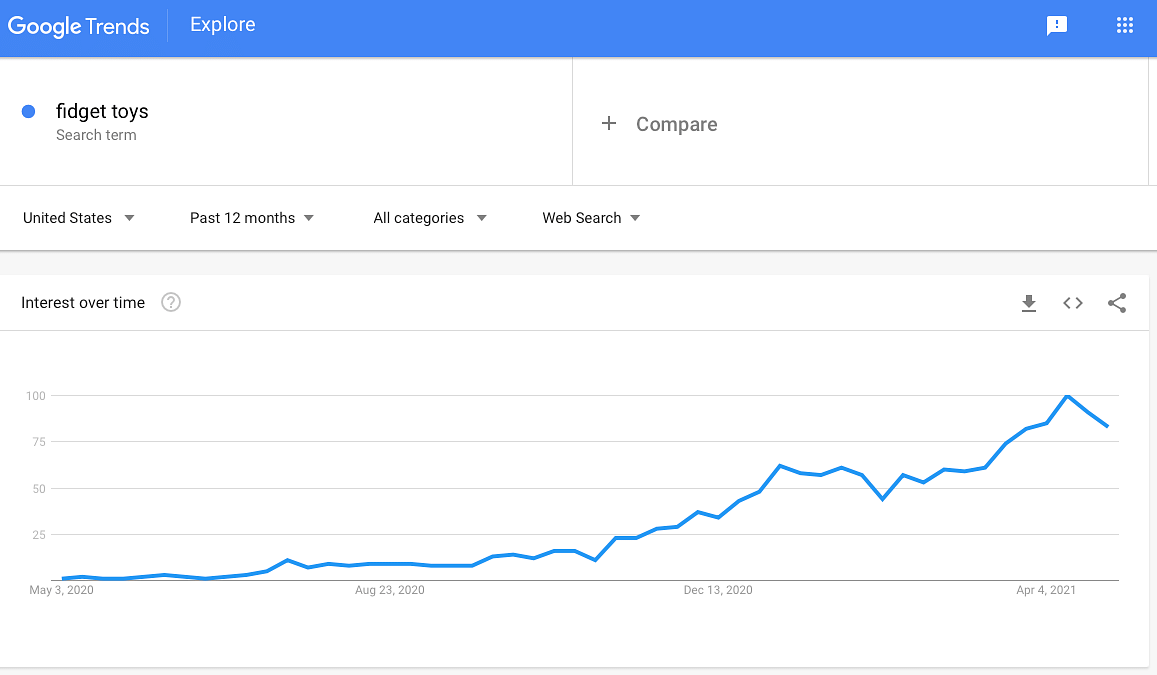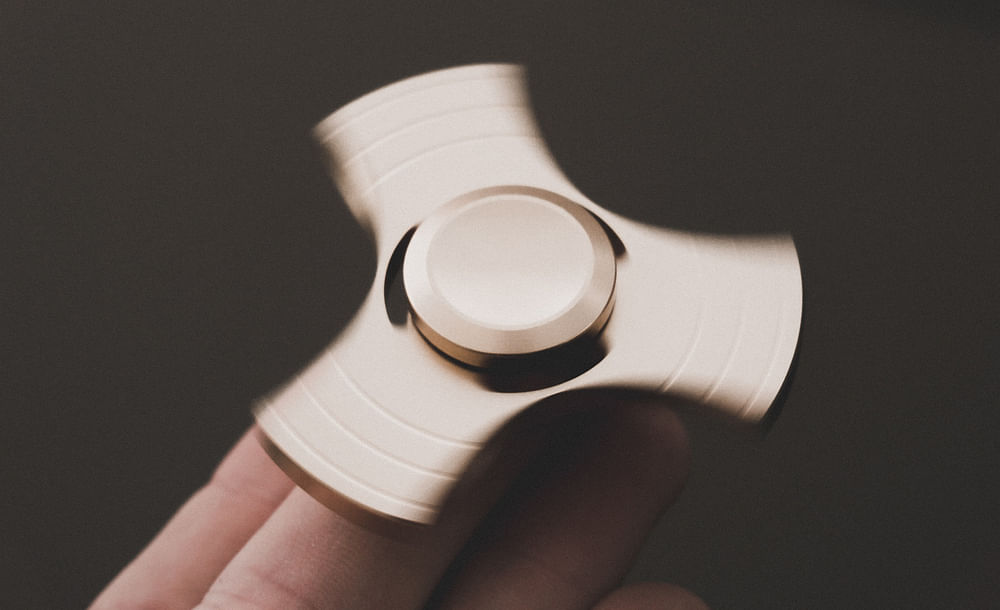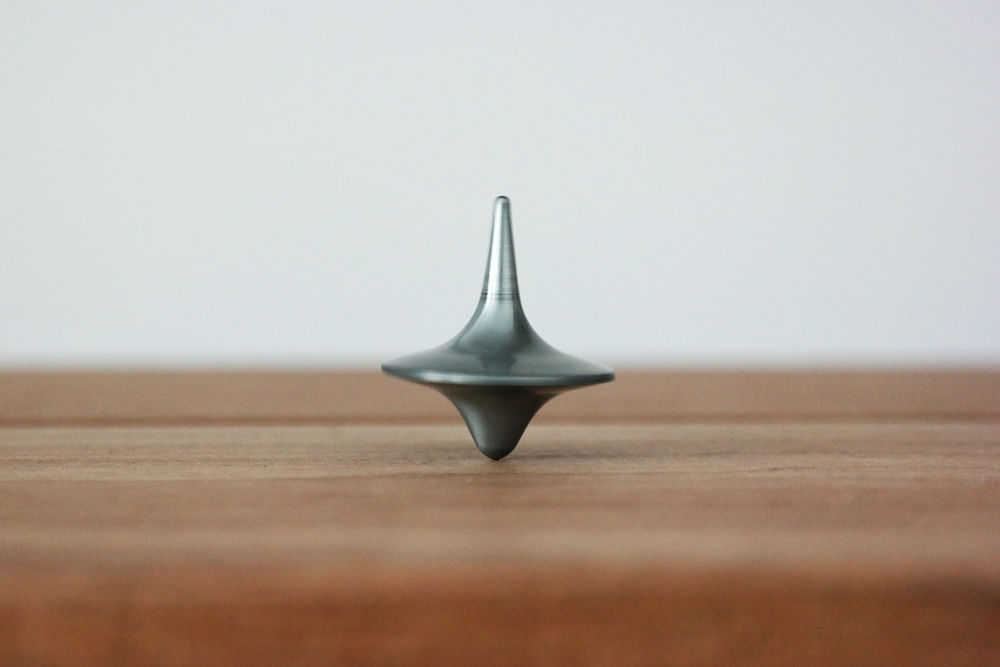Fidget Toys Calm Anxiety
It doesn’t seem that long ago that fidget spinners were everywhere. Used by both adults and kids. Luckily, that fashion seems to have faded away, but fidget toys are now very popular - probably kickstarted by the fidget spinners. Fidget toys and fidget cubes provide a safe and drug-free way to calm nerves and anxiety via their tactile input. (However, this is not medical advice, and you should seek professional help if you need to).
When life becomes unpredictable - like during the Covid pandemic - anxiety thrives. The surge in interest in fidget toys has increased dramatically during 2020-2021.

The trick is to alter the location of the anxiety with sensory toys. From the brain to the fingers. This could be as simple as jangling pocket change or playing with a zipper on an item of clothing. Pencil spinning is very popular too. However, it really comes into its own when keeping both hands busy as this uses both sides of the brain and helps shift the anxiety stress into something physical. The results are a decrease in anxiety, an increase in calmness and even a reduction of the speed of your breath.
Obviously, fidgeting didn’t start when fidget spinners hit prime time, stress balls came first. You will have been in a meeting with a “pen clicker” or “hair twirler”. Maybe even you’ve had the misfortune to sit next to someone with Restless Leg Syndrome. This type of fidgeting helps maintain focus when involved in a long task - or stuck in a dull meeting.
A lot of this is to do with the environmental stimulation levels individuals prefer. Some like to work in silence, others thrive in a noisy environment. Using high quality fidget toys can help adjust these levels and improve focus whilst reducing anxiety. If you can’t leave your space to take a walk or enjoy a lovely mug of camomile tea to calm yourself, then the simple act of rubbing a smooth stone can help adjust how you perceive your environmental stimulation.

The desire for these kind of mindful play toys was literally kickstarted in 2016 and 2017 with two products on Kickstarter with really not very high goals. They needed to raise about $20k to make two items that claimed to help with stress and anxiety. They were smash hits and went on to raise millions and helped create an industry to treat anxiety with mindful toys.
Initially, the Fidget Cube dropped. They got almost $6.5m and were in the game around 12 months before the fidget spinner hit the big time. After that, the Gravity Blanket promised to give you a better night's sleep and proved the market by getting $4.7m.
These two products did not hit mainstream virality because some big company was backing them with a huge marketing campaign. Instead, they clearly hit a nerve. Regular people saw the video and believed in what they were claiming.
What did happen is both products help create awareness of the "anxiety economy" including coloring books for adults, aromatherapy, wooden puzzles, productivity essential oils and even the whole CBD market.
When it comes to mental illness in America, anxiety is now the most common complaint by far. It impacts 1/3 of Americans over their lifetimes, according to research from the Anxiety and Depression Association of America. And it's easy to find things to blame: Covid, your cell phone, Facebook, FOMO, toxins, air pollution, climate change and so on and so on. Finding any cure is increasingly problematic as funding for this type of research has been cut dramatically. Therefore, people are reaching out on their own for help.
As is so often the case, medical research on the matter doesn’t always agree. Some researchers saying it does calm the mind, and others saying it doesn’t. However, one this is for certain, it doesn’t make anxiety any worse.
The truth of the matter is none of these mindful toys treat the underlying issues, even if they can ease the symptoms. The claims now are fidget toys can be "used" for health conditions, rather than something that can treat them. There's very little research on mindful play or fidget toys, and what there is seems to say the act of fidgeting with anything is what helps, not neccessarily a toy.

No one really knows how fidget toys work, aside from their role as a distraction. The key seems to be that they are physical items. Because we're touching them, it helps us focus on something aside from our internal anxiety and stresses.
It's important to realize that none of these products will "solve" anxiety, or ADHD, or autism, or OCD. That is a much larger problem that is traditionally solved by therapy, or dramatic lifestyle changes. Or both.
This anxiety economy has flourished because they did something very simple. Asked people if they'd ever wanted to fidget with objects. Why, yes, of course. And asked if people would prefer a better night's sleep? Impossible to say no. So with such wide-reaching statements and the only possible response being yes, they tapped into people's desire for less anxiety and stress and better sleep hygiene.
Millions of people are now more aware they are stressed or anxious. Aware their sleep could be better. And, crucially, the whole thing has been de-stigmatized.
#itsoktonotbeok
Browse our range of mindful play toys
